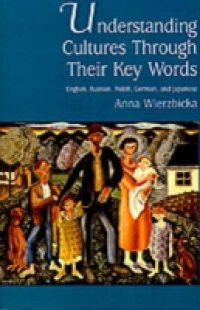This book develops the dual themes that languages can differ widely in their vocabularies, and are also sensitive indices to the cultures to which they belong. Wierzbicka seeks to demonstrate that every language has key concepts, expressed in key words, which reflect the core values of a given culture. She shows that cultures can be revealingly studied, compared, and explained to outsiders through their key concepts, and that the analytical framework necessary for this purpose is provided by the natural semantic metalanguage, based on lexical universals, that the author and colleagues have developed on the basis of wide-ranging cross-linguistic investigations. Appealing to anthropologists, psychologists, and philosophers as well as linguists, this book demonstrates that cultural patterns can be studied in a verifiable, rigorous, and non-speculative way, on the basis of empirical evidence and in a coherent theoretical framework.

